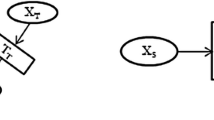Abstract
Human beings follow a continuous learning paradigm, i.e., they learn to solve smaller and relatively easy problems, retain the learnt knowledge and apply that knowledge to learn and solve more complex and large-scale problems of the domain. Currently, most machine learning and evolutionary computing systems lack this ability to reuse the previous learnt knowledge. This paper presents a lifelong machine learning model for text classification that extracts the useful knowledge from simple problems of a domain and reuses the learnt knowledge to learn complex problems of the domain. The proposed approach adopts a rule-based learning classifier system, and a rich encoding scheme is used to extract and reuse building units of knowledge. The experimental results show that the continuous learning approach outperformed the baseline classifier system.








Similar content being viewed by others
References
Arif MH, Jin X, Li J, Iqbal M (2017a) Text classification using lifelong machine learning. In: Proceedings of the 24th international conference on neural information processing (ICONIP), Springer International Publishing, pp 394–404
Arif MH, Li J, Iqbal M (2017b) Solving social media text classification problems using code fragment based XCSR. In: Proceedings of the international conference on tools with artificial intelligence (ICTAI), Boston, MA, USA, pp 485–492
Arif MH, Li J, Iqbal M, Peng H (2017c) Optimizing XCSR for text classification. In: Proceedings of the IEEE symposium on service-oriented system engineering (SOSE), San Francisco, CA, USA, pp 86–95
Arif MH, Li J, Iqbal M, Liu K (2018) Sentiment analysis and spam detection using learning classifier systems. Soft Comput 22:7281–7291. https://doi.org/10.1007/s00500-017-2729-x
Butz MV, Wilson SW (2002) An algorithmic description of XCS. Soft Comput 6(3–4):144–153
Chen Z, Liu B (2016) Lifelong machine learning. Morgan and Claypool, San Rafael
Chen Z, Ma N, Liu B (2015) Lifelong learning for sentiment classification. In: Proceedings of 53rd annual meeting of the association for computational linguistics and the 7th international joint conference on natural language processing of the Asian Federation of Natural Language Processing (ACL-IJCNLP 2015), vol 2. Association for Computational Linguistics (ACL), pp 750–756
Iqbal M, Browne WN, Zhang M (2014) Reusing building blocks of extracted knowledge to solve complex, large-scale Boolean problems. IEEE Trans Evolut Comput 18(4):465–480
Iqbal M, Browne WN, Zhang M (2015) Improving genetic search in XCS-based classifier systems through understanding the evolvability of classifier rules. Soft Comput 19(7):1863–1880
Maas AL, Daly RE, Pham PT, Huang D, Ng AY, Potts C (2011) Learning word vectors for sentiment analysis. In: Proceedings of the 49th annual meeting of the association for computational linguistics: human language technologies, Portland, Oregon, USA, pp 142–150
Shu L, Xu H, Liu B (2017) Lifelong learning CRF for supervised aspect extraction. In: Accepted at ACL 2017, Vancouver, Canada. Association for Computational Linguistics
Silver DL, Yang Q, Li L (2013) Lifelong machine learning systems: beyond learning algorithms. In: AAAI spring symposium series, California, USA, pp 49–55
Sutton RS, Koop A, Silver D (2007) On the role of tracking in stationary environments. In: In Proceedings of the 24th international conference on machine learning, (ICML ’07), New York, NY, USA. ACM, pp 871–878
Urbanowicz RJ, Moore JH (2009) Learning classifier systems: a complete introduction, review, and roadmap. J Artif Evol Appl 2009:1–25
Wilson SW (1995) Classifier fitness based on accuracy. Evolut Comput 3:149–175
Wilson SW (2000) Get real! XCS with continuous-valued inputs. In: Lanzi PL, Stolzmann W, Wilson SW (eds) Learning classifier systems. Springer, Berlin, pp 209–219
Acknowledgements
This work is supported by NSFC program (Nos. 61472022, 61421003), SKLSDE-2016ZX-11 and partly by the Beijing Advanced Innovation Center for Big Data and Brain Computing.
Author information
Authors and Affiliations
Corresponding author
Ethics declarations
Conflict of interest
The authors declare that they have no conflict of interest.
Ethical approval
This article does not contain any studies with human participants or animals performed by any of the authors.
Additional information
Communicated by V. Loia.
Publisher's Note
Springer Nature remains neutral with regard to jurisdictional claims in published maps and institutional affiliations.
Rights and permissions
About this article
Cite this article
Arif, M.H., Iqbal, M. & Li, J. Extracting and reusing blocks of knowledge in learning classifier systems for text classification: a lifelong machine learning approach. Soft Comput 23, 12673–12682 (2019). https://doi.org/10.1007/s00500-019-03819-5
Published:
Issue Date:
DOI: https://doi.org/10.1007/s00500-019-03819-5




